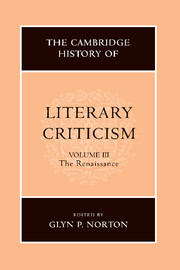Book contents
- Frontmatter
- Introduction
- READING AND INTERPRETATION: AN EMERGING DISCOURSE OF POETICS
- POETICS
- THEORIES OF PROSE FICTION
- 29 Theories of prose fiction in England: 1558–1700
- 30 Theories of prose fiction in sixteenth-century France
- 31 Seventeenth-century theories of the novel in France: writing and reading the truth
- 32 Theories of prose fiction and poetics in Italy: novella and romanzo (1525–1596)
- CONTEXTS OF CRITICISM: METROPOLITAN CULTURE AND SOCIO-LITERARY ENVIRONMENTS
- VOICES OF DISSENT
- STRUCTURES OF THOUGHT
- NEOCLASSICAL ISSUES: BEAUTY, JUDGEMENT, PERSUASION, POLEMICS
- A SURVEY OF NATIONAL DEVELOPMENTS
- Bibliography
- Index
- References
29 - Theories of prose fiction in England: 1558–1700
from THEORIES OF PROSE FICTION
Published online by Cambridge University Press: 28 March 2008
- Frontmatter
- Introduction
- READING AND INTERPRETATION: AN EMERGING DISCOURSE OF POETICS
- POETICS
- THEORIES OF PROSE FICTION
- 29 Theories of prose fiction in England: 1558–1700
- 30 Theories of prose fiction in sixteenth-century France
- 31 Seventeenth-century theories of the novel in France: writing and reading the truth
- 32 Theories of prose fiction and poetics in Italy: novella and romanzo (1525–1596)
- CONTEXTS OF CRITICISM: METROPOLITAN CULTURE AND SOCIO-LITERARY ENVIRONMENTS
- VOICES OF DISSENT
- STRUCTURES OF THOUGHT
- NEOCLASSICAL ISSUES: BEAUTY, JUDGEMENT, PERSUASION, POLEMICS
- A SURVEY OF NATIONAL DEVELOPMENTS
- Bibliography
- Index
- References
Summary
There is a significant methodological problem which has to be addressed before any ‘history’ of critical ideas about prose fiction in England in the sixteenth and seventeenth centuries can proceed. During the period in question, no writer saw works like Philip Sidney's Arcadia (1590), Thomas Nashe's Unfortunate traveller (1594), Margaret Cavendish's Blazing world (1666) or William Congreve's Incognita (1692) as belonging to the same genre. Therefore, when we consider issues such as debates over appropriate style in prose fiction, or controversies about characterization in romance, it is important to remember that such issues never extended to any conception of a genre constructed by the twentieth century in response to the modern obsession with the novel.
Notions of the novel and its origins cast a cloud over considerations of both the nature of prose fiction in the period preceding the eighteenth century and theoretical ideas from the earlier period which might in some way have anticipated the work of Defoe, Richardson, and Fielding. A considerable body of recent theoretical writing has revisited and refocused the thesis of Ian Watt's influential Rise of the novel. The work of Lennard Davis, Michael McKeon, J. Paul Hunter, and Robert Mayer has changed our ideas of the novel's prehistory, but all these writers look back at the earlier period in order to understand more clearly the developmental model proposed initially by Watt, projecting a form of teleological determinism which hampers any chance of looking at pre-eighteenth-century fiction from within its own concerns. (Exactly the same problem occurs in A. J. Tieje's work on early prose fiction, despite his greater focus on actual works of fiction from the sixteenth and seventeenth centuries.)
- Type
- Chapter
- Information
- The Cambridge History of Literary Criticism , pp. 293 - 304Publisher: Cambridge University PressPrint publication year: 1999
References
- 2
- Cited by



